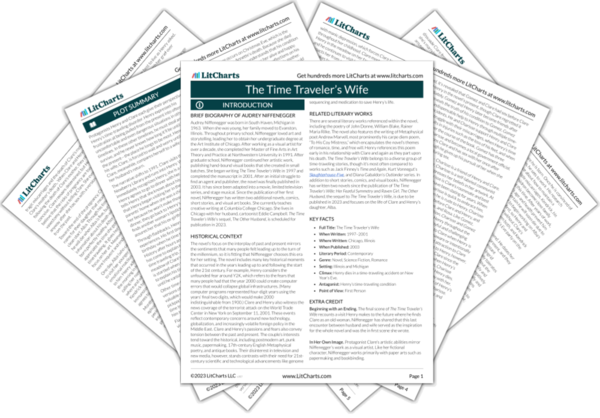Annette Lyn Robinson Quotes in The Time Traveler’s Wife
“My mother dying…it’s the pivotal thing…everything else goes around and around it…I dream about it, and I also—time travel to it. Over and over. […] if you had enough time to really look at everything, you would see me. I am in cars, behind bushes, on the bridge, in a tree. I have seen it from every angle, and I am even a participant in the aftermath: I call the airport from a nearby gas station to page my father with the message to come immediately to the hospital. I sat in the hospital waiting room and watched my father walk through on his way to find me. […] I walked along the shoulder of the road, waiting for my young self to appear, and I put a blanket around my thin child’s shoulders.”
“You were very lucky.”
He smiles, still shielding his face in his hands. “Well, we were and we weren’t. One minute we had everything we could dream of, and the next minute she was in pieces on the expressway.” Henry winces.
“But don’t you think,” I persist, “that it’s better to be extremely happy for a short while, even if you lose it, than to be just okay for your whole life?”
[…] “I’ve often wondered about that. Do you believe that?”
I think about my childhood, all the waiting, and wondering, and the joy of seeing Henry walking through the Meadow after now seeing him for weeks, months […] “Yes,” I say, “I do.”
Mr. DeTamble nods. “Henry has chosen well.”
As I sit beside Clare and read the poem I forgive Lucille, a little, for her colossal selfishness and her monstrous dying, and I look up at Clare. “It’s beautiful,” I say, and she nods, satisfied, for a moment, that her mother really did love her. I think about my mother singing lieder after lunch on a summer afternoon […] I never questioned her love. Lucille was changeable as wind. The poem Clare holds is evidence, immutable, undeniable, a snapshot of emotion.

Annette Lyn Robinson Quotes in The Time Traveler’s Wife
“My mother dying…it’s the pivotal thing…everything else goes around and around it…I dream about it, and I also—time travel to it. Over and over. […] if you had enough time to really look at everything, you would see me. I am in cars, behind bushes, on the bridge, in a tree. I have seen it from every angle, and I am even a participant in the aftermath: I call the airport from a nearby gas station to page my father with the message to come immediately to the hospital. I sat in the hospital waiting room and watched my father walk through on his way to find me. […] I walked along the shoulder of the road, waiting for my young self to appear, and I put a blanket around my thin child’s shoulders.”
“You were very lucky.”
He smiles, still shielding his face in his hands. “Well, we were and we weren’t. One minute we had everything we could dream of, and the next minute she was in pieces on the expressway.” Henry winces.
“But don’t you think,” I persist, “that it’s better to be extremely happy for a short while, even if you lose it, than to be just okay for your whole life?”
[…] “I’ve often wondered about that. Do you believe that?”
I think about my childhood, all the waiting, and wondering, and the joy of seeing Henry walking through the Meadow after now seeing him for weeks, months […] “Yes,” I say, “I do.”
Mr. DeTamble nods. “Henry has chosen well.”
As I sit beside Clare and read the poem I forgive Lucille, a little, for her colossal selfishness and her monstrous dying, and I look up at Clare. “It’s beautiful,” I say, and she nods, satisfied, for a moment, that her mother really did love her. I think about my mother singing lieder after lunch on a summer afternoon […] I never questioned her love. Lucille was changeable as wind. The poem Clare holds is evidence, immutable, undeniable, a snapshot of emotion.











